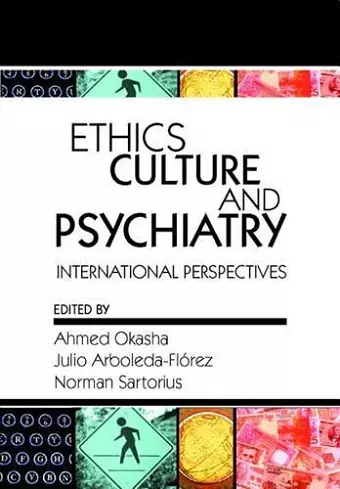Ethics, Culture, and Psychiatry
International Perspectives
Ahmed Okasha editor Norman Sartorius editor Julio Arboleda-Flórez editor
Format:Paperback
Publisher:American Psychiatric Association Publishing
Currently unavailable, our supplier has not provided us a restock date

Every medical act is a moral act, and this affirms the relevance for all of us of this volume on ethics in a world that is increasingly multicultural. Professor Okasha and his collaborators at the World Psychiatric Association gave us the luminous Madrid Declaration Ethical Standards for Psychiatric Practice, and now they offer us a superb review of cultural contrasts on some of the most challenging ethical issues today. Juan E. Mezzich, M.D., Ph.D., Professor of Psychiatry and Director, Division of Psychiatric Epidemiology and International Center for Mental Health, Mount Sinai School of Medicine, New York, New York This is a most vitally important book for the psychiatric profession and the medical community. Ethics is not like one hand clapping. It incorporates community values, cultural norms, and guidelines to protect our patients and retain their trust. The delivery of ethical guidelines for every profession requires the negotiation of values designed to enhance the relationship, produce the most effective outcomes, and gain respect for the profession. For psychiatrists this is a critical area for developing responsive relationships in spite of myths, stigma and ignorance about our practices. The contributors of this book present and comment on the variants of ethical values and guidelines throughout the world. At the same time, they ably articulate the common basis of an international code of ethics for the psychiatric profession. Harold M. Visotsky M.D., Owen L. Coon Professor of Psychiatry, Northwestern University Medical School, Chicago, Illinois
Ethics, Culture, and Psychiatry: International Perspectives is much more than just a book on ethics – it is a major contribution to understanding the impact of culture and history on the ethical practice of medicine around the world.
Ethics, Culture, and Psychiatry: International Perspectives is a textbook that explores the best ways to promote the use of the Declaration of Madrid, which outlines ethical standards for psychiatric practice throughout the world. The book is written with two questions in mind, both easy to pose and difficult to answer:
• Is it possible to formulate a set of principles that will be valid for all psychiatrists, regardless of the cultures to which they belong or in which they live and practice, or are there as many sets of ethical principles as there are cultures?
• If there is such a set of principles, what should we do to ensure that psychiatry as a discipline makes a significant contribution to societal good without helping the evil?
To facilitate the exploration of this territory, 15 experts from a variety of cultures examine the most pressing ethical issues prevalent within the current practice of psychiatry. Many of the dilemmas probed in this book are routinely encountered by clinicians who work in increasingly multicultural societies. The text covers issues that are broadly relevant to clinical practice and research, including:
• An overview of ethics and societies around the world
• Discussions of ethical practices and dilemmas specific to various cultural regions
• Transcultural debate on overarching issues, such as incompetent patients, informed consent, and mental health law reform
• The complete copy of The Declaration of Madrid printed in the appendix
Readers will find that this is a textbook that stimulates and supports, rather than closes, the debate on ethical aspects of professional psychiatric behavior. Ethics, Culture, and Psychiatry: International Perspectives is much more than just a book on ethics – it is a major contribution to understanding the impact of culture and history on the ethical practice of medicine around the world, and a continuous search for a consensus on how to live together and make contributions to the well-being of people with mental illness, their families, and the family of humans on our planet.
Rapid scientific developments can obscure the more important role of ethics. The editors of this volume are to be congratulated for recognizing and fulfilling an obligation to the field.
-- Robert Cancro, M.D. * American Journal of Psychiatry *In an increasingly multicultural society, most clinicians in the United States routinely encounter many of the ethical dilemmas probed in this book. They will, no doubt, find the content of this edited work compelling and thought provoking reading that is broadly relevant to clinical practice and research.
* New England Journal of Medicine, Vol. 344 No. 18 *[T]his is a book that will be food for thought as international ethics in psychiatric practice is debated in the future.
* Journal of Clinical Psychiatry 62:8 *The editors have surely taken on a daunting task, and they have succeeded. The volume proffers a culturally panoramic view of ethics and psychiatry. It should satisfy readers aspiring to basic knowledge of the ethical practices of psychiatry, particularly from a transcultural perspective. And indeed, the volume is a boon to readers interested in the thorny question of whether, and if so to what degree, issues relating to ethics and psychiatry may transcend not-inconsiderable cultural chasms. . . . I recommend the volume heartily to all readers genuinely interested in weaving ethical and cultural strands within psychiatric practice.
-- Morton D. Sosland, M.D. * PsychosomatiISBN: 9780880489997
Dimensions: 229mm x 152mm x 19mm
Weight: 404g
248 pages